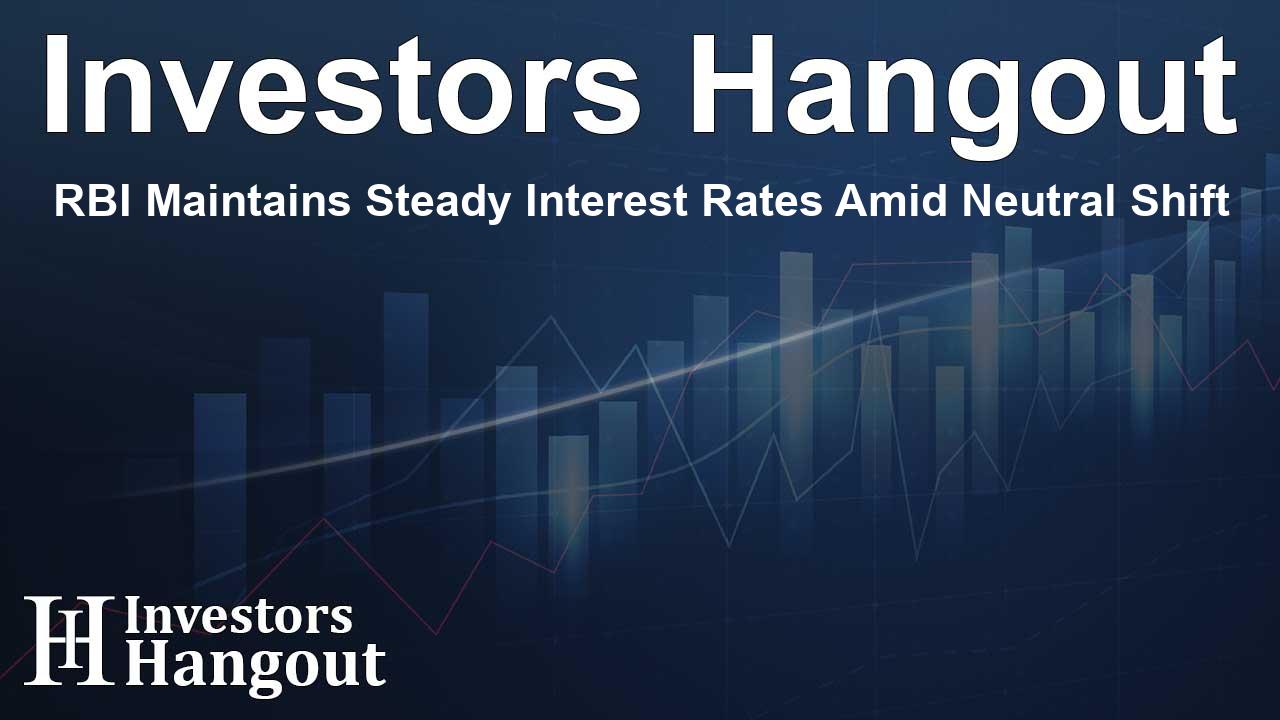RBI Maintains Steady Interest Rates Amid Neutral Shift

RBI Maintains Interest Rates and Embraces Neutral Position
The Reserve Bank of India (RBI) has decided to keep its interest rates unchanged, a move that aligns with the expectations of financial analysts and economists. This decision was reached during a recent meeting on a Wednesday, where the central bank also indicated a strategic shift to a neutral stance regarding its monetary policy.
Policy Repo Rate Held at 6.5%
For the tenth consecutive meeting, the RBI maintained its policy repo rate at 6.5%. Out of the six members of the rate-setting committee, five voted in favor of holding the rate steady. This consistency reflects the RBI's careful consideration of current economic conditions and inflationary pressures.
RBI's Approach to Inflation Monitoring
RBI Governor Shaktikanta Das emphasized the importance of closely monitoring inflation trends. He expressed concerns that inflation is projected to remain persistent in the upcoming months. However, Das adopted a less aggressive tone compared to previous meetings, suggesting that the RBI is easing its tight grip on monetary policy for the time being.
Understanding the Shift to a Neutral Stance
Das highlighted that the decision to shift to a neutral stance is a response to the current balance of prevailing and expected inflation growth conditions. This strategic change indicates that the RBI is likely moving away from a prolonged period of tightening policy and is taking a more measured approach going forward.
Implications of Inflation Risks
Despite this moderation in stance, Das acknowledged the significant risks that still loom over inflation. He mentioned the potential impacts of adverse weather conditions, geopolitical tensions, and increases in commodity prices as ongoing challenges that could affect India’s economic stability.
Future Rate Cuts Under Consideration
Recent surveys, such as one conducted by Reuters prior to the RBI's meeting, reflected expectations among economists that the central bank might consider shifting to a neutral position, potentially paving the way for a rate cut of 25 basis points in December. This potential change indicates a growing confidence in managing inflation while also supporting economic growth.
India's Robust Economic Growth
Governor Das affirmatively stated that India’s growth trajectory remains strong and intact. Even though inflation rates have decreased recently, they are still anticipated to be above the RBI's annual target of 4%. Nevertheless, he suggested that the associated risks appear to be balanced, allowing for some optimism regarding future economic conditions.
Impact of Food Prices on Inflation
Looking forward, Das predicted a significant increase in the Consumer Price Index (CPI) print for September, primarily driven by rising food prices. However, he confidently noted that inflation is expected to stabilize and trend lower in the following quarters, aided by promising crop yields.
Global Economic Consideration
Despite facing high interest rates and persistent inflation, India remains one of the fastest-growing economies globally, consistently achieving approximately 7% GDP growth over the past three years. However, projections indicate that this growth may begin to ease due to softer economic conditions observed in other parts of the world.
Frequently Asked Questions
What did the RBI decide regarding interest rates?
The RBI decided to keep the policy repo rate unchanged at 6.5% during its recent meeting.
What does the shift to a neutral stance mean?
The shift to a neutral stance indicates the RBI's potential openness to adjusting interest rates based on future economic and inflation developments.
How does inflation impact the RBI's policies?
Inflation levels greatly influence the RBI's monetary policy decisions, as they strive to maintain stability while fostering economic growth.
What are the prospects for India's economic growth?
India's economic growth is expected to remain robust, although it may moderate due to external factors impacting global economies.
What are the anticipated trends in inflation?
Inflation is expected to trend lower in the coming months, thanks in part to favorable agricultural yields, despite short-term spikes primarily from food prices.
About The Author
Contact Ryan Hughes privately here. Or send an email with ATTN: Ryan Hughes as the subject to contact@investorshangout.com.
About Investors Hangout
Investors Hangout is a leading online stock forum for financial discussion and learning, offering a wide range of free tools and resources. It draws in traders of all levels, who exchange market knowledge, investigate trading tactics, and keep an eye on industry developments in real time. Featuring financial articles, stock message boards, quotes, charts, company profiles, and live news updates. Through cooperative learning and a wealth of informational resources, it helps users from novices creating their first portfolios to experts honing their techniques. Join Investors Hangout today: https://investorshangout.com/
The content of this article is based on factual, publicly available information and does not represent legal, financial, or investment advice. Investors Hangout does not offer financial advice, and the author is not a licensed financial advisor. Consult a qualified advisor before making any financial or investment decisions based on this article. This article should not be considered advice to purchase, sell, or hold any securities or other investments. If any of the material provided here is inaccurate, please contact us for corrections.
